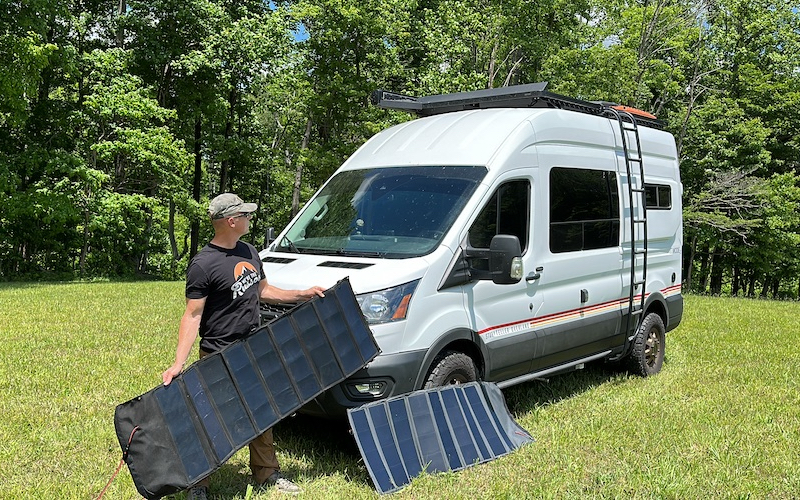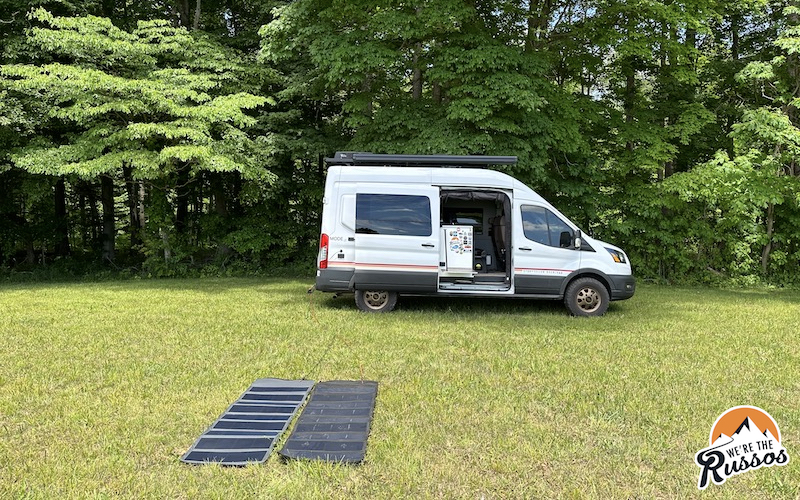This post may contain affiliate links.
If you are an RV owner or are considering getting one, you may be trying to figure out which type of solar panel is best for your RV. In this RV solar guide, I will cover the pros and cons of portable solar panels vs rooftop solar panels and share our real life experiences with RV solar to help you figure out the best RV solar panels for you.
We also made a video all about portable solar panels vs rooftop solar panels for RVs that you can watch here or below.
Portable Solar Panels vs Rooftop Solar Panels
Both types of RV solar panels have their unique merits and downsides, and your final decision will hinge on your specific needs and circumstances. We’ve had firsthand experience with portable RV solar panels and rooftop RV solar panels across our multiple campers, but before we dive right in, let’s cover the role of solar panels in an RV.
Understanding Solar Power in an RV
A common misconception is that an RV runs directly on solar power. The reality, however, is that solar serves as a charger for the RV’s battery bank. When the sun shines, the solar panels absorb energy and charge the RV’s batteries. When you turn on the lights, microwave, or inverter in your RV, it is the stored energy in the batteries that is used. The solar panels simply replenish this energy, ensuring your RV has power when you need it. Check out our RV Solar 101 video to learn more about the role of solar in an RV.
When considering an RV solar system, make sure to understand your RV’s battery capacity, inverter size (if it has one) and how you plan to use the power systems when camping. This will help you determine the amount of solar you need for the RV.
For example, if your RV battery bank is 100 amp hours, investing in 1000 watts of solar doesn’t make any sense unless you also plan on upgrading your battery bank – it would be like using a fire hose to fill a bucket. The inverse is true as well – if you have a huge battery bank and you’re running many things in the RV, a 100 watt solar panel will not make a noticeable impact.
Pros and Cons of Portable Solar Panels vs Rooftop Solar Panels

1. Cost and Installation
Rooftop solar panels are generally half the price of portable solar panels. Portable panels are usually framed with attached wiring and sometimes even a solar charge controller, which increases their cost. However, installation costs for rooftop solar panels can be higher. This is because these panels need to be mounted to the roof, which can sometimes involve drilling holes into the RV and potentially cause water leaks down the road.
Conversely, with many modern RVs having exterior plugs for solar, portable panels can be a simple plug-and-play solution. If your RV doesn’t come with an exterior solar plug, you can use alligator clips or install a plug with a charge controller to the batteries.
Remember, a charge controller is necessary to regulate power between the solar panels and the RV’s battery bank, regardless of the type of RV solar system you opt for.
2. Versatility
Portable solar panels take the lead in versatility. You can lend portable panels to a friend, move them around easily, or use them for car camping to charge a small battery power station. Basically, they offer a range of applications beyond your RV, making them a versatile choice. And if you sell your RV, you can take your portable panels with you and use them in your next RV.
3. Maintenance
Portable solar panels are easier to maintain than rooftop solar panels because they are easy to clean. Lay the portable solar panel on the ground and wipe it down. Cleaning rooftop solar panels, on the other hand, can be more of a challenge as it requires climbing onto the RV’s roof and not all RVs have ladders built in.
4. Solar Set Up
Rooftop solar panels are always on, absorbing sunlight, and charging the RV’s batteries. With portable solar panels, you’ll have to remember to bring it with you, take it out when you arrive at camp, set it up, and plug it in. Additionally, you need to remember to stow it away before leaving camp.
5. Storage
Rooftop solar panels don’t take up interior storage space as they are mounted on the roof of the RV. However, if you want to store items such as kayaks or canoes on the roof of the RV, these items can obstruct the rooftop solar panels preventing them from getting sunlight.
Portable solar panels will require storage space within your camper and depending on the size of your RV, this could be a challenge. Portable solar panels also come in different sizes, which means it could weigh quite a bit and take up more space than you want. One of the reasons we love our Overland Solar portable solar panels is because each panel is 130 watts and folds down to a small size that is easy to store and does not take up a lot of storage space.
6. Capacity
Rooftop solar panels typically offer more capacity, limited only by the size of your RV’s roof. Portable solar panels are typically limited to 20 amps due to the common amp rating of pre-installed RV solar plugs.
When we were at the Tampa RV Show, there was a 5th wheel with 10,000 watts of solar on the roof. You can check it out, in our Tampa RV Show video.
7. Security
Rooftop solar panels are more secure as they are bolted onto the roof of the RV. Although theft of rooftop solar panels is relatively rare, it can happen.
Portable solar panels are more susceptible to theft and need to be kept secure or stored when not in use.
8. Upgrades
Upgrading is easier with portable solar panels. You can sell the old panel and buy a new one. Upgrading rooftop solar panels requires uninstalling the current system and installing a new one, which may also include new wiring, charge controller, etc to handle the additional wattage the new panels will be putting out.
9. Usability
Portable solar panels allow you to park the RV in the shade and still harness solar energy by placing the panels in the sun. Rooftop solar panels require your RV to be parked in the sun, which is not ideal on hot days.

Our Experiences with RV Solar
Our journey with RV solar began in 2015, when we decided to take on the full-time nomadic lifestyle. In this section, I will share the different types of RVs and the type of solar set up in each RV.
Class A RV Solar Set Up
We started full time RV life in a Class A motorhome, with a hundred-amp hours of deep cycle battery and no solar panels.
The options were to install rooftop solar panels or use a portable solar panel. Given the costs of installing a rooftop solar system and being new to full-time RV life, we chose a Renogy one hundred-watt portable solar panel with a built-in charge controller. The set up was simple, with alligator clips attaching directly to the RV’s battery system, and it worked for our boondocking adventures when we did not want to run the on-board generator.
Class B RV Solar Set Up
In 2017, we downsized from Class A to Class B RV life and had our first experience with rooftop solar panels on an RV. The Class B camper van built on a ProMaster chassis had 320 watts of rooftop solar and 400-amp hours of lithium batteries.
The rooftop solar setup comfortably handled our day-to-day power needs, from keeping the lights on to charging our devices and cooking Kait’s Instant Pot meals. However, if we parked in the shade or ran the AC, the solar couldn’t keep up, and we had to rely on the autostart system to recharge the lithium batteries.
Check out the RV solar Q&A we filmed while living out of this camper.
Truck Camper Solar Set Up
After a few years of Class B RV life, we switched to a pop-up truck camper mounted on a Ford F350 Super Duty truck. This RV had 320 watts of rooftop solar, 250 watts of portable solar and a 300-amp hour lithium battery system.
This was our first experience living out of an RV with rooftop solar panels and portable solar panels. Since the truck camper did not have A/C, the rooftop solar panels were more than adequate to keep the camper batteries charged.
When we parked the truck camper in the shade, we would deploy the Overland Solar portable solar panels to harness the sun’s energy.
For reference, here are a few of the items we ran on a daily basis (in addition to the vent fans and fridge):
- Electric coffee grinder – 165 watts
- Electric water kettle – 1,500 watts
- Electric multi-cooker – 1,000 watts
- Charge devices (laptops, cell phones, e-readers, backup batteries)
Current RV Solar Set Up
Our current RV is a Class B camper van by Storyteller Overland built on the Ford Transit chassis. This RV has 90 watts of rooftop solar, 260 watts of portable solar and a 1000-amp hour lithium battery system.
This RV has the most robust energy setup we have experienced so far. The idea behind the large battery bank is to use the vehicle’s secondary alternator to recharge the battery bank while driving. Using this method, we can be stationary four to five days before we have to break camp and drive around or idle the engine on high to recharge the batteries.
When we prefer to camp longer, we have two Overland Solar portable solar panels for a total of 260 watts. These, coupled with the 90 watts rooftop solar panel is enough to double the amount of time we can stay camped in one spot before having to break camp and drive around to charge the batteries.
Final Thoughts
Our experiences with different RV solar set ups has taught us that rooftop solar panels and portable solar panels can complement each other well, each one compensating for the other’s shortcomings. Both have their pros and cons, and the best choice depends on various factors, such as your RV’s power needs and budget.
For instance, with our Class A motorhome’s small battery bank, it didn’t make sense to invest heavily in an RV solar system without also upgrading the RV’s batteries. So, if you’re considering a solar setup for your RV, it’s essential to understand your power needs and limitations and to look at your camper’s electrical system as a whole. Consulting professionals can also provide you with valuable insights to help make the most suitable choice for your situation.
Remember, an efficient solar system is not just about the solar panels; it’s also about the batteries, your energy consumption, and your RV lifestyle. And when these aspects are harmoniously combined, you can significantly enhance your RV experience.
Thank you for reading! I hope you found this comparison of portable solar panels vs rooftop solar panels helpful. If you have experience with either or both, please fee free to share by leaving a comment below or on the video.

Thanks for the info on solar panels, we are in the market to get some and it helps to get most info before we buy!